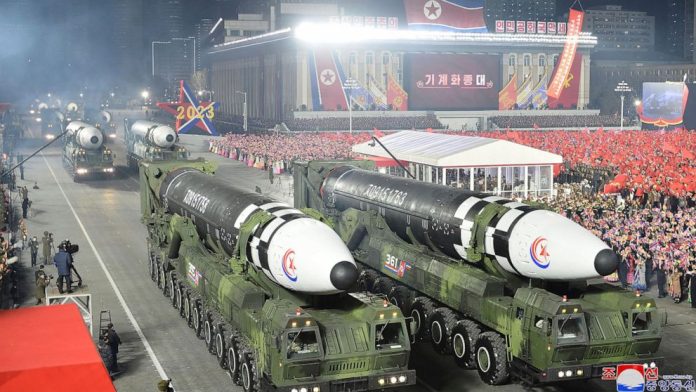North Korea fired a long-range ballistic missile from its capital Pyongyang towards the sea, officials in South Korea and Japan said Saturday.
The launch came a day after North Korea’s Foreign Ministry threatened “unprecedently” strong action against its rivals, after neighboring South Korea announced a series of planned military exercises with the United States.
Calling it “an outrageous act that is escalating provocations against the international community as a whole,” Japan’s Prime Minister Fumio Kishida said North Korea had launched an intercontinental ballistic class missile.
Speaking to reporters after a National Security Council meeting, he said that his country had “launched a very staunch protest,” adding that his country would work with the U.S. and South Korea.
At a separate news conference, his Chief Cabinet Secretary Hirokazu Matsuno said the missile was launched from a site near North Korea’s capital Pyongyang. He added that it was airborne for 66 minutes before it landed around 125 miles west of Oshima Island in Japan’s exclusive economic zone.
Yasukazu Hamada, Japan’s defense minister later told reporters that based on calculations it could have had a range of almost 8,700 miles “in which case, the entire United States would be within its range.”
South Korean officials confirmed the launch and their data matched that provided by the Japanese.
“North Korea’s launching of the long distance missile is a serious act of provocation that harms the peace and security not only of the Korean peninsula but also of the international community,” the country’s Joint Chiefs of Staff said in a statement.
“It also is a clear violation of United Nations Security Council resolutions and we strongly urge North Korea to stop immediately,” the statement added.
There was no comment from North Korea which is coming off a record year in weapons demonstrations with more than 70 ballistic missiles fired, including ICBMs with potential range to reach the U.S. mainland in 2022. But this was its first since Jan. 1, when it test-fired a short-range weapon.
However, state media reported last month that its leader Kim Jong Un had ordered the “exponential” expansion of his country’s nuclear arsenal, the development of a more powerful intercontinental ballistic missile and the launch of its first spy satellite.
To encounter North Korean nuclear threats, U.S. military services responded on Jan. 31 that they would deploy more advanced weapons to Korean Peninsula, while North Korea responded that it was prepared to counter the U.S. with the “most overwhelming nuclear force.”













